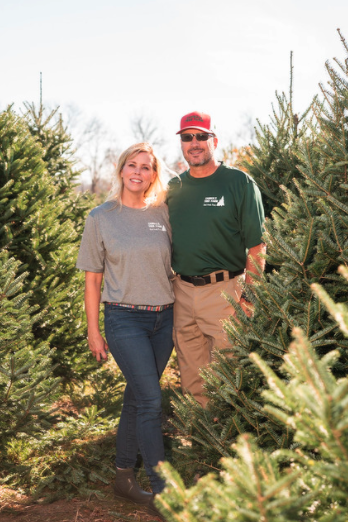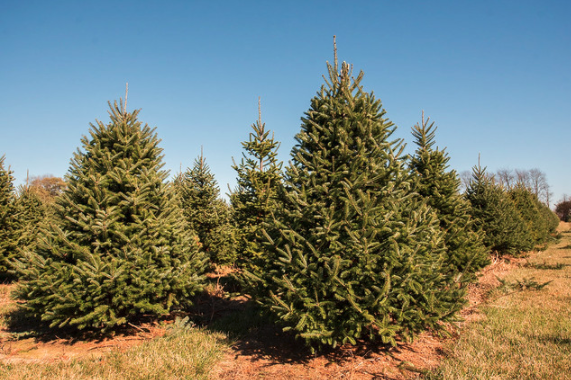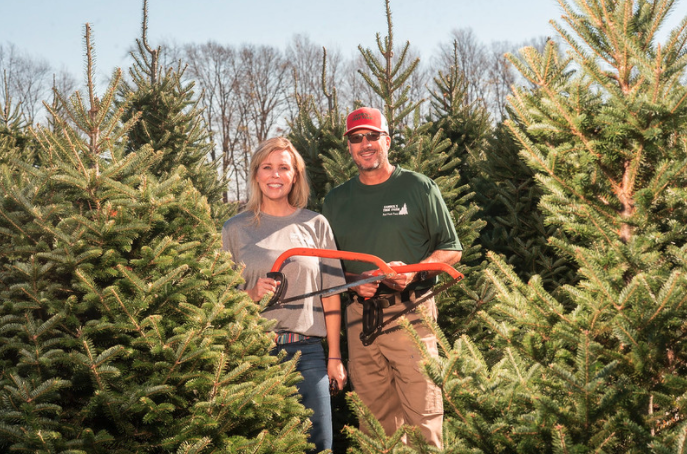Sambol’s Tree Farm Is Keeping a Holiday Tradition Alive
Photographer / Amy Payne
For years Lance Sambol enjoyed owning a golf practice center in McCordsville, but when the recession hit in 2008, he decided to sell the business and switch gears opening Sambol’s Tree Farm. He was looking for a career in which he could work outdoors as he had before, but not something that took up 12 hours of his day like his golf business did. One day he saw a news segment highlighting Dull’s Tree Farm.

“They did a panoramic shot of the land and I saw these straight rows of trees, a log cabin and a barn, and I told my wife, ‘Let’s go tomorrow, get a tree, and check this place out,’” Sambol says.
He chatted with the owner of Dull’s to find out more about the business, and the owner suggested Sambol join the Indiana Christmas Tree Growers Association (ICTGA), through which members share knowledge, tips and lessons learned. An entrepreneur at heart, Sambol decided to go for it. He bought land in Fortville and planted his first trees in the fall of 2009. From the start, he took cues from his farmer friends, learning along the way.
“I went from knowing absolutely nothing about growing Christmas trees to getting heavily involved,” Sambol says. “Now, 12 years later, I’m the president of the ICTGA as well as the national representative from Indiana to the National Christmas Tree Growers Association.”
Sambol was enticed by the Christmas tree industry because it offers flexibility, which enables him to get his young daughter on and off her school bus. Plus, he gets to work in the great outdoors.
“My office is an 18-acre tree farm – can’t beat that,” Sambol says.

Though the Christmas tree selling season is only two to three weeks long, it takes all year to prepare. In a typical season, Sambol plants 1,700 trees. In early March, he determines where each of those trees will go, then spaces them 7’ apart. In April saplings are delivered, and then Sambol and eight high school or college kids embark on the grueling process of planting.
“It goes pretty quick as one guy punches the holes and then we come in behind him, pop in the tree, and go to the next hole,” Sambol says.
During the growing season, he focuses on weed control and cutting grass. In late summer he starts shearing and shaping the trees.
“You’ve got to touch every tree a couple of times, and when you’ve got 12,000 trees on the farm it takes some time,” says Sambol, noting that some trees will not grow a top while others will send up four tops, three of which have to be snipped out.
In October Sambol starts putting price tags on the trees and getting the farm ready for opening day – the day after Thanksgiving. He does, however, open on the Tuesday and Wednesday before Thanksgiving to sell pre-cut Frasier fir trees.
“Some people don’t want to grab a saw and cut it down themselves but they still want to come to a tree farm for that experience,” Sambol says.
Though he sells a few white pines, the industry has shifted toward firs, as they provide soft needles, typically strong needle retention, and firm branches for hanging ornaments.
At Sambol’s Tree Farm, the staff shakes dead needles from trees, runs them through a baler to compress them, and ties them to vehicles. The business also offers a tree delivery and pickup service.
The staff members will also pick up trees on the first Saturday in January. Sambol’s Tree Farm is a sponsor of the Fishers Christmas Tree Recycling program, and the trees are chipped, turned into mulch, and placed around little trees in Fishers parks.

Sambol’s wife Susan helps during the selling season, working in the gift shop where the business sells tree stands, wreaths, garlands, candles and homemade ornaments crafted by local artisans. There is also a food trailer, Gloria’s Heavenly Creations, that sells chili, pulled pork sandwiches and hot chocolate.
Sambol hires a crew to help during his busy selling days to keep the customer flow going smoothly.
“We do most of our business the Friday, Saturday and Sunday after Thanksgiving, and the following Saturday and Sunday,” says Sambol, noting that last year he sold 1,400 trees, including 400 on opening day.
This year due to COVID-19, the business is requiring visitors to make an appointment on weekends in order to space out crowds, to maximize social distancing. This measure will also help with parking, as Sambol is allowing 50 people for one-and-a-half-hour blocks of time.
“It’s a bad experience for everyone when 400 people show up all at once,” Sambol says. “This way folks can pick a tree, get it processed, shop around and not be crowded.”
Sambol greets visitors as they arrive at the farm and directs them where to go, while Susan thanks them at the conclusion of their visit when they are paying.
“I think it’s important that we talk to our customers twice during their time here,” Sambol says. “After all, we only see them once a year so you’ve got to do it right,”
Fir tree prices are as follows: 6’ for $66; 7’ for $81; 8’ for $98; 9’ for $119; 10’ for $135.
Sambol’s Tree Farm is located at 7783 North State Road 9 in Fortville. For more information, call 317-850-0135 or visit sambolstreefarm.com.





